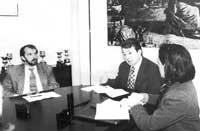Quality, more than fashion
1996/12/01 Irureta Azkune, Onintza | Kaltzada, Pili - Elhuyar Zientziaren Komunikazioa Iturria: Elhuyar aldizkaria

The days were held on 7 and 8 November in Donostia. It was a good opportunity to make known the experiences that have been carried out so far in terms of quality, but the intention of the organizers was not limited to mere dissemination. To explain these claims, we address Eugenio Ibartzabal, a member of the Gipuzkoa XXI Forum, which represents ADEGI, ELKARGI, the Kutxa Foundation and the University of the Basque Country.
According to him, “the concept of quality risks considering it a fashion. Faced with the need to respond to the moment, many organizations and companies have filtered blindly in quality programs. What's more, instead of dressing with the new philosophy collected in these programs, they have preferred to believe that with quality certification this question of quality is over. For them, therefore, the quality is a fashion, something that is requested now, but that is soon forgotten. I, of course, am not of the same opinion.”
By pulling this thread, our interlocutor immediately came to analyze the different ways of understanding the quality that exists today. As has already been mentioned, the quality has been understood in some cases as a condition to be able to compete on a global level, “for them,” said Eugenio Ibartzabal, “the quality production system is nothing more than a document that opens the doors of customers from all over the world; in these cases, the quality has not altered the core of the production and, surpassed the initial bureaucratic mixing of the quality procedures, it has been internalized. But quality is much more than that.” Eugenio Ibartzabal has just published his book 'Passion for continuous improvement', in which he analyzes quality from a human perspective.
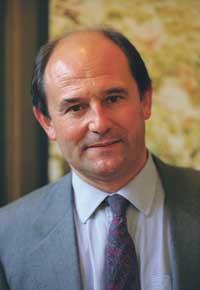
In fact, it was to this that the interlocutor immediately redirected our conversation: “In my opinion, quality is another way of seeing things; we could talk about philosophy, but there are those who start to suspect. In my opinion, we all want to do things right inside: we want to take care of our personal life, we want to be at ease at work, we want our work to be effective and valuable and, as it were, we want to be owners of what we do. If we analyze quality from a human point of view, the first thing to highlight is that quality is not a strange form of operation that has been imposed on us from the outside, but a desire for self-improvement. The quality assurance systems and the management procedures arise to channel this desire, but they are, in short, means to reach the quality.” According to this behavior, all activities, both economic and personal, must be analyzed globally to find what is really important; according to Eugenio, we must be clear what we want to achieve, set objectives and analyze what is necessary to reach them.
The incorporation of this procedure into education does not prevent the objectives of the school or centre from consolidating and acting accordingly. “The incomparable artist Michelangelo was asked once, with his impressive sculpture Dabid in front, how something like a pujante stone could be achieved, and his response seems quite representative to me: ‘It has been easy, he takes away what was left and was there’. That is the production of quality.”
Opening the way, laying the foundations
In these days of cultural integration of the quality in the education that have been carried out in Donostia, we also knew the experience of the centers of Vocational Training of Tolosa, Bergara, Usurbil and Martutene. These four centers are members of Ikaslan and have spent two years integrating quality management into daily tasks. The members of the Gipuzkoa XXI Forum came to them to inform them of the quality procedures and they started immediately.
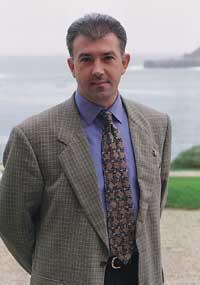
His work has therefore been a transgressor, since until then there was no similar experience between us. The directors of the four centers explained that the quality models in education will be the most important soon and that, even if you hear contrary opinions, in the future will be fully accepted. In short, the directors of these centers pointed out that this two-year experience has been a total success. According to Iñaki Mujika, director of the Professional School of Usurbil, “it has served us on a personal level, it has allowed us to foresee the necessary changes in our organization, it has helped us to become more involved and has provided us with the right model to manage our schools.”
When organizing it, it has been advantageous to start a total quality, but the tangible result of this project has not yet been seen: registration has not increased significantly and the academic results of the students have not improved either, but the directors of the centers have seen that in other aspects there is a good way: “Once we have learned what quality management is, we are working on a practical model; before we did not have a self-evaluation model, we did not see it necessary, but today we can know if we are working well at all times; in addition, before we could not receive the opinion of our clients about what we offered them, and quality management has opened up new ways to reach students, parents and companies.”
Looking to the future
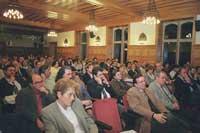
Knowing that the question was naive, we asked Eugenio Ibartzabal before leaving the Miramar Palace: How will our classes be in the future? “Depending on the needs of society, no doubt. Iran will change with society and will have to adapt to new needs. The profile of current students should be equal to what they will do in the future, since the school is not, although many believe it, something that is outside of society; our schools must be absolutely dynamic, aligned with the objectives that have been set and that will make efforts to achieve them.”
Daniel Meade
ZETIAZ-Elhuyar: At the Instituto de Monterrey you work in quality education. How has your experience been?
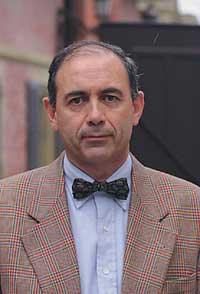
Daniel Meade. It has been a very long process. The institute was born in 1943 and in 1985 the Continuous Improvement Program was launched, so we have been with this program for ten years. In these ten years we have highlighted, on the one hand, that the number of students has increased, from 20 to 60,000 students this year. The initial school was a leased house and currently we have 26 campuses spread throughout Mexico. The latest innovation is the Virtual University, located in South America, Canada and the United States. Both aspects refer to the material scope of the project, but the most important thing is to verify that the quality of teaching has improved significantly. As a result of quality education, many of our students find work or create their own businesses before the five years of completing their studies. In addition, they acquire high positions. And above all, these ex-students function as agents in our community, not only in industry, but also in society and politics. This effort to improve administration and teaching in schools is reflected in society through the work of these students.
N-D: Can your experience be matched with that of Euskal Herria? How can this quality concept be introduced in the schools of Euskal Herria?
D. D. M. M. The organizations are different. Private schools have a greater flexibility in their functioning, while public institutions have many opportunities for work and improvement by the high number of students. In addition to this advantage, we must not forget that public institutions also have the support of the government, which facilitates access to the resources necessary to channel the changes. However, we must take into account the other side of the coin: schools are large, politicized and bureaucratized, with greater resistance to changes.
The four schools that began to work on the implementation of the quality project have taken their first roots. Of the ideas contributed three years ago have grown new and different fruits. With the different word I do not want to make assessment: they are neither better nor worse than others, but different from each other, and in that sense they are all very good results.
Robert Winter
ZETIAZ - Elhuyar: What will be the functions of the Chair of Quality?
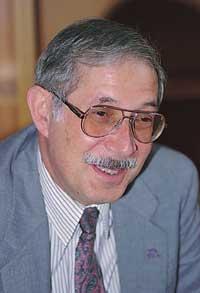
Robert Winter: To begin with, we will organize an office dependent on the Vice-rector of the San Sebastian Campus from which we will work for the whole University. For example, we will work with the faculty to analyze the relationships between teachers and students at the beginning and be able to take the necessary steps to improve. In fact, once we have done the analysis of the process, we have seen that teachers teach many times, but that students do not learn. Therefore, we will have to work with teachers to use different techniques in classrooms to improve relationships with students. In addition to teaching, we will work on other aspects related to the University.
For example, how to make enrollment, how to do the rest of administration managements... These services must be improved so that the client, both from the University and outside it, is satisfied. The general idea is to transform the University, make a new kind of institution. The truth is that the project is not yet fully linked and it is difficult to enter the specifications of the project. I myself will have to start a lot because I do not know the situation of the University of the Basque Country and, of course, the solutions of the United States will not serve for the problems here. Of course, it's not about picking up my ideas and putting them here. The societies of the United States and here are very different, so before I start working I will have to immerse myself and move into the environment here.
C.D. : Will the quality chair be developed exclusively at the University?
R. R. W: W: In the future, the University will contact other sectors of society, mainly the industry. In fact, the University is a knowledge center that can offer services to industry, to businesses. The intention of the Chair of Quality is: To analyze the work of the University for the economic and social development of the Basque Country. The Vocational Training schools are also part of this project and, as mentioned above, we will take into account industry, companies and the government itself. Many times we see the university as an isolated organization of society, without closeness to the people and I think we have to break with that tendency or conviction, because the University is part of the human community.
Franklin Schargell
ZETIAZ - Elhuyar: According to your experience, the project that combines quality and education has worked well. What are the problems that occur in schools when it comes to implementing quality projects?
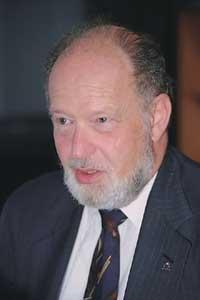
Franklin Schargell. In my opinion, the most important difficulty is cultural or thought change. Until now, the faculty was not asked to participate in improvement systems of the school organization. On the other hand, students have never felt part of this educational network and have become accustomed to it as a passive element, they simply tell students how to do things. In addition, parents are also totally excluded from being a part; teachers consider that all educational responsibility is theirs and do not ask for the participation of parents. Therefore, the attitude of students, teachers and parents must change if you want to implement a quality education system.
In addition, there are economic and important problems. In the United States, and I think it is the same in Euskal Herria, the state does not support schools. In the United States there is more jail and reformatories than school. There are no real grants for which economic problems can totally hinder the implementation of these projects.
C. C. - R.: Can experiences in schools in the United States be matched with those of Euskal Herria? What process is taking place in the evolution of Basque schools?
F. F. S. S. All schools are similar, both in Euskal Herria and in the United States. In all schools we find the same elements: teachers, students and parents. In any case, we are of different cultures and, precisely, that is the main element that distinguishes foreign schools from here. However, the challenges we have today are in all of his cases, the situation unifies all schools, although with very different cultures.
In Euskal Herria things are doing well. I am really surprised with the four schools that have launched the quality plan. What has been done for two years is incredible. The directors of these centers have led the process perfectly and have internalized very well what is necessary to achieve a quality education.
These Basque schools have advanced a lot, and as foreigners are now being brought to the conferences on quality of education, from now on it will be those of the Basque schools that will account for their experience abroad. They will be able to show their fruitful and successful experience in Euskal Herria and act as an example, encouraging other schools to advance these projects.

Gai honi buruzko eduki gehiago
Elhuyarrek garatutako teknologia




